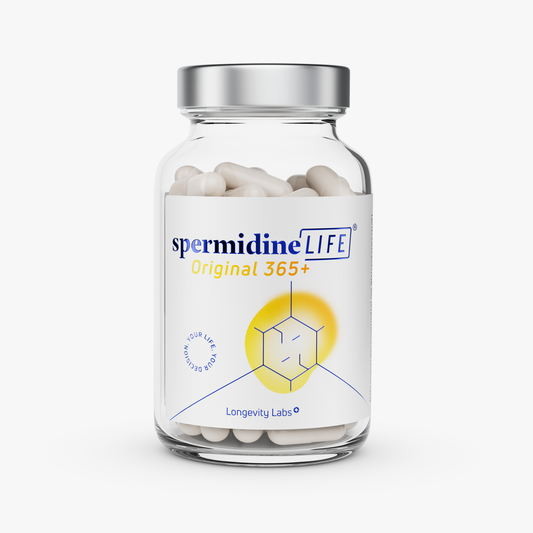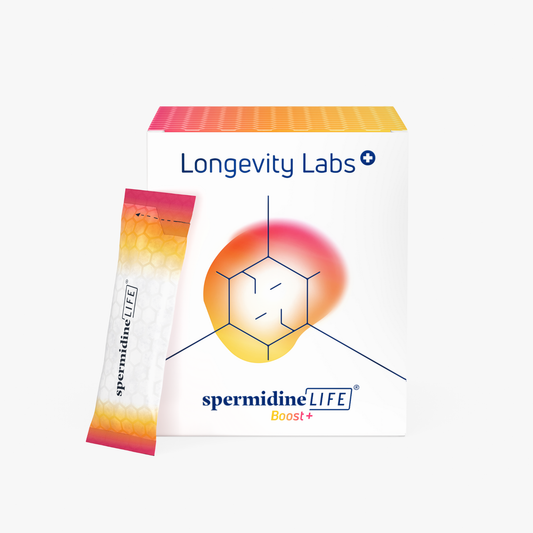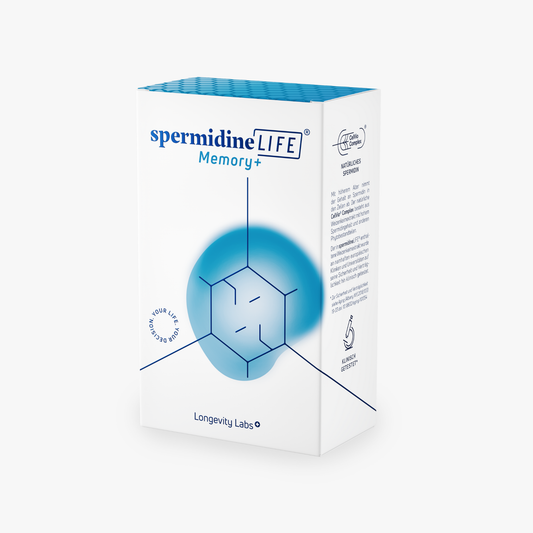
Yoga as a new anti-aging trend with success
TLL LongevityLabsYoga is currently the new anti-aging trend. The effects of YMLI (Yoga and Meditation based lifestyle intervention) go far beyond psychological and physical well-being. A study has shown that yoga can also slow down your aging process.
An ancient Sanskrit proverb says, "For breath is life, and if you breathe well, you will live long on earth." The latest research now proves the ancient wisdom right. For according to this, yoga is not only good for the soul and the body, but also for the cells! Not without reason, Cell Yoga courses are currently booming in various yoga studios around the globe, as are scientific surveys to explore its positive effects in more detail. But one thing at a time...
What is YMLI?
YMLI or "Yoga and Meditation based lifestyle intervention" refers to an integrative health strategy that incorporates the classical components of yoga. These include asanas (postures), pranayama (breathing exercises) and dhayna (meditation). Derived from a blend of the Hatha and Raja styles of yoga, they are designed to specifically intervene in our hectic daily lives and provide greater balance and health.
And YMLI can do just that, as Sat Bir S. Khalsa, research director of the Kripalu Yoga and Health Center, confirms, "Lifestyle interventions such as yoga and meditation can impact well-being, immune function and longevity. They can bring about changes at the molecular level in the cells of our bodies."
But how exactly does YMLI accomplish this?
1. YMLI increases your flexibility, improves your balance and strengthens your muscle tone.
The asanas or postures stretch the body to maintain or increase flexibility. Regular yoga increases your body awareness and improves your balance. Holding the asanas for longer periods of time and the controlled transitions in the movements are an effective workout that targets a wide range of our muscle tone - including muscles that you otherwise hardly use. This allows for more range of motion as you age and can reduce injuries, such as after falls.
2. YMLI strengthens your body from within
First, yoga guides the joints through their full range of motion, preventing cartilage and joint damage. Second, the weight bearing in the asanas strengthens the bones and - according to studies - also increases overall bone density. Third, yoga increases the heart rate into the aerobic zone, which decreases resting heart rate, increases endurance and will improve maximum oxygen uptake during exercise. The pranayama - or breathing exercises - can also help you use less oxygen while moving: Yogis - yoga practitioners - can take fewer breaths with greater volume. Last, yoga lowers blood sugar and LDL cholesterol - meaning "bad" cholesterol - while raising HDL cholesterol, or "good" cholesterol. This is because yoga lowers cortisol and adrenaline levels and promotes weight loss. All of this eventually leads to preventing degenerative arthritis and osteoporosis, lowering the risk of heart attacks, kidney failure and depression, and improving lung function.
3. YMLI Strengthens Your Immune System
Dhayna - or meditation - has a beneficial effect on immune system function, increasing appropriate immune responses when needed and decreasing inappropriate immune responses, as in autoimmune disease. In addition, yoga lowers cortisol levels, as noted above. This is because yoga increases the activity of the parasympathetic nervous system and decreases the activity of the sympathetic nervous system - responsible for fight or flight - which leads precisely to a reduction of the stress hormone cortisol in the body. High cortisol levels compromise the immune system, can lead to permanent changes in the brain, and have been linked to depression, osteoporosis, hypertension, and insulin resistance.
4. YMLI supports your detoxification and cleansing.
Many of the asanas stimulate blood flow to the various organs through the poses, effectively assisting the body in naturally flushing out toxins. For example, digestion in the intestines is stimulated or the lymphatic system is cleansed, which can subsequently better destroy diseased cells and remove toxic waste in the body. The breathing exercises of pranayama together with the positions of the asanas provide better blood circulation and oxygen supply in the body. The poses bring fresh oxygenated blood to the organs and inversion postures reverse the flow of blood from the lower body to the brain and heart, allowing oxygen to reach all cells. Additionally, yoga increases hemoglobin levels in red blood cells. This decreases the risk of digestive tract diseases and prevents blood clots, heart attacks and strokes.
5. YMLI reduces stress and relaxes
Pranayama and Dhayna calm our nervous system by lowering stimulation and reducing irritation, as well as a purposeful in-turning. As a result, practitioners have a better awareness of life situations and the strength and peace of mind to let things go. Yoga provides rest for the nervous system and better sleep, making you less tired, stressed, and accident-prone in your daily life.
That sounds pretty good, we think. But knowing you, you want to know more. After all, where's the evidence that YMLI extends lifespan and supports cells? The answer, here:
YMLI and cellular aging.
A 2017 study conducted at the All India Institute of Medical Sciences (AIIMS) study has shown that yoga's intervention on lifestyle runs even deeper than previously known. Researchers Madhuri Tolahunase, Rajesh Sagar and Rima Dada examined the impact of yoga and meditation on cellular aging in 96 apparently healthy individuals.
In this study, the subjects participated in a YMLI program of theoretical and practical sessions 5 days per week over a 12-week period. Each session included a series of asanas, pranayama, and dhayna for approximately 90 minutes. For the first two weeks, these took place under the guidance of specialized yoga instructors at the health clinic at AIIMS in New Delhi. For the remaining 10 weeks, the participants were at home with regular adjustments and checkups.
After 12 weeks, the researchers analyzed the extent to which the intervention had changed relevant cardinal and metabotrophic biomarkers in the blood of the subjects. You are probably wondering now what this means. So we'll try to make it even clearer:
On the one hand, the researchers checked relevant cardinal biomarkers of cellular aging, such as DNA damage, telomere attrition, and oxidative stress. All markers that should already be familiar to you, otherwise you can here again. DNA damage was assessed by the "damage marker" 8-OH2dG. Telomeres were evaluated by telomere length and telomerase activity. Oxidative stress was evaluated by the biomarkers of reactive oxygen species (ROS) and total antioxidant capacity (TAC).
On the other hand, metabotrophic blood biomarkers associated with cellular aging were evaluated. These include cortisol, endorphin, IL-6, BDNF, and sirtuin-1 levels in the subjects. We have not discussed these in more detail in the past, but for the time being we just want to assure you here that they serve as relevant markers of the blood picture to decipher the aging processes.
The results
So what was the result of the evaluation of all these test values? After only 12 weeks, all subjects showed significant improvements in both cardinal and metabotrophic biomarkers of cellular aging. Mean levels of 8-OH2dG, ROS, cortisol, and IL-6 were significantly lower, and mean levels of TAC, telomerase activity, β-endorphin, BDNF, and sirtuin-1 were significantly increased. Thus, all levels developed in a positive direction.
Or to put it more simply, YMLI significantly reduces the rate of cellular aging in the apparently healthy population and even seems to partially reverse this process! Thus, regular yoga as an integral part of lifestyle could help slow the aging process, prevent the onset of multifactorial complex lifestyle-related diseases, and prolong mental, physical, and reproductive health and youthful healthy life.
"The results of this study highlight the beneficial effects of YMLI on biomarkers of cellular aging and on promoting cell longevity through changes in both cardinal and metabotrophic biomarkers," said the researchers involved. But these impressive results could lead to further successes. "To combat stress anxiety and depression, yoga could play a key role. Yoga, particularly pranayama, decreases the expression of pro-inflammatory genes and increases the expression of anti-inflammatory genes. It may also play an important immunomodulatory role in cytokine storm," the researchers opined.
Thus, the study showed highly relevant, and forward-looking results that scientifically confirm the positive effects of yoga and meditation. In any case, we are curious to see what this field of research in the area of longevity and cell aging will reveal in the future. By the way, these and other studies have shown that the health-promoting effects do not depend on how old or how experienced you are when you start yoga, but only on how often you practice. Therefore, it's never too late to get started! Namaste!






